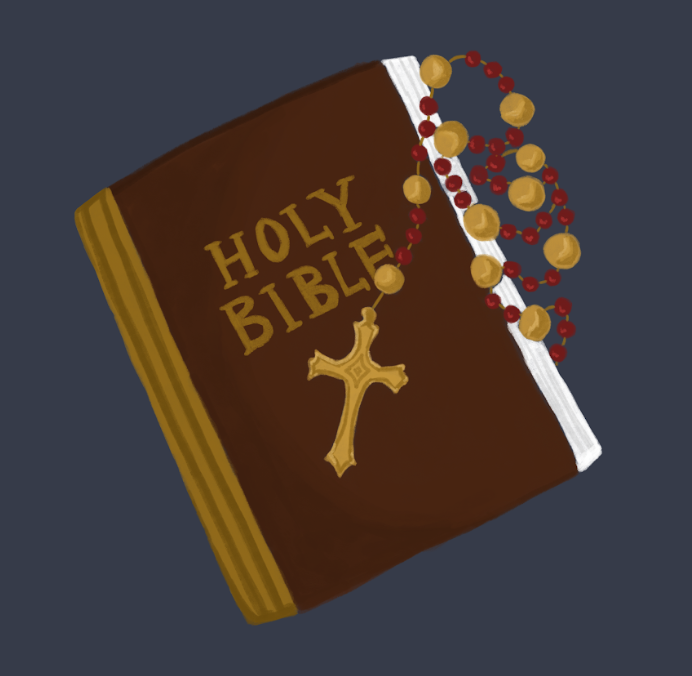Americans United for Separation of Church and State took to downtown San Antonio to advocate against the state’s recent measures to push religious and Christian rhetoric in schools. With a focus on pushing for policy through events, combatting laws through litigation and spreading awareness, AU has fought for “protecting the foundational American principle of freedom of religion” for nearly 80 years.
One such event was the Separation of Church and State: Drawing the Line for Our Public Schools discussion panel hosted at Trinity University by the National Council of Jewish Women. The panel featured David Brockman, a professor at Texas Christian University and scholar for the Baker Institute’s Religion and Public Policy Program, Rachel Laser, the President of AU, and Texas State Representative James Talarico. Moderator David Martin Davies covered topics, including Christian Nationalism, Texas’s new Bluebonnet Learning curriculum, a bill to post the 10 Commandments in every classroom in the state and the usage of unlicensed, religious chaplains as school counselors.
Brockman, who did an independent review of the Bluebonnet Curriculum for Texas Freedom Network, called it “an open resource curriculum for reading and language arts for kindergarten through 5th grade, [with] the idea to have a state approved curriculum with full instructional materials that any school district can pull from so they don’t have to purchase materials from the usual publishers.” While Brockman believes it is “theoretically a pretty good idea,” he recognizes that the curriculum “vastly over emphasizes Christian and biblical content at the expense of other religions.” He cites that Judaism, Islam, Buddhism, Sikhism and Hinduism are all presented in a limited scope, while biblical stories, like the great flood, wisdom of king Solomon and the last supper, are all “implicitly treated as straightforwardly true and historical.” According to the Texas Tribune, districts that adopt the curriculum will also receive $60 per student.
One school district that has already begun implementing this curriculum is South San Antonio ISD. In an interview conducted after the event, Laser expressed her concern that “kids in [South San Antonio ISD] won’t feel as welcome in their public schools, and might even be ostracized or bullied because they can’t fully endorse what the state is teaching.” She and the panel hold that the curriculum “will actually affect the learning environment for everyone for the worse.”
Representative Talarico expressed his fear that, given the already high teacher turnover rate, more teachers will leave the classroom and that students are being given a disservice if teachers are not focusing on increasing academic outcomes. Brockman also highlighted that the 10 Commandments teachers would have to post in their classrooms are specifically prescribed by the Texas Legislature. Those commandments “apply only to [particular] groups of Christians, not Christians overall” because it includes sections that are not in the Roman Catholic Church or the Lutheran Church.
All three speakers urged the importance of separating church and state in regards to both the government and the values of Christianity. As a Christian, Rep. Talarico defined Christian Nationalism as “the worship of power in the name of Christ.” He says it was used to consolidate power in the “Roman Empire, Jim Crow south, Nazi Germany and now, in this country.” Affirming Rep. Talarico’s sentiment, Brockman held that because the United States began with a diverse set of Christian faiths that disagreed, the founders knew that if “the government favored one religious community over others, [it] would bring descent and ruin [their] young nation.”
In addition to pointing out potential harms of religious legislation, the panel provided several reasons why it should not be allowed. Laser, who is also an attorney, spoke on how executive orders in the first Trump administration used religious freedom as a “sword” to deny healthcare, turn away people from social services and to deny individuals jobs. She also brought attention to a prior Supreme Court case, Stone v Graham, where the court struck down legislation that required the 10 Commandments to be posted in Kentucky classrooms. Using that case as a precedent and the Establishment Clause in the constitution, she voiced her hopes that the Supreme Court will rule against these laws.
In the meantime, the panel gave the audience hope for what could be done until then. A lesson in the Bluebonnet Curriculum that had misinterpreted the golden rule as a solely Christian value was changed to include the perspectives of other religions that mention it. Parents and students can advocate against institutionalized religion by contacting AU. Students can stay updated on these issues through AU’s social media accounts and can join the organization for free.
As deeply religious people, the panel affirmed that “no one is going after voluntary prayer in school. What we’re going after is government coerced prayer, government mandated prayer.” They desire for people to build bridges and appeal to those who they may not agree with or may be different to “create a way forward.”








